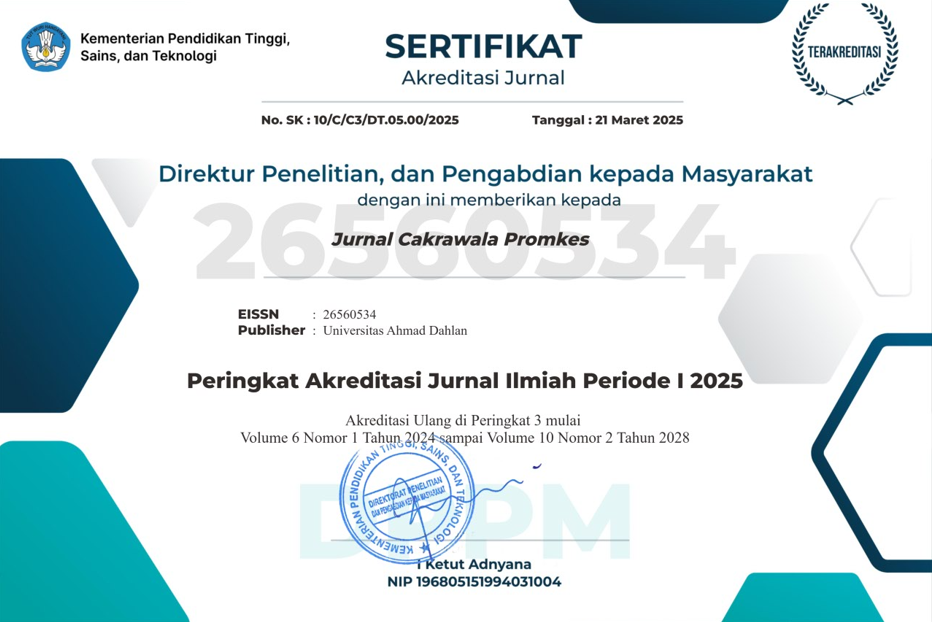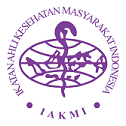Hubungan lama penggunaan gadget dengan perilaku sosial anak prasekolah
DOI:
https://doi.org/10.12928/promkes.v2i2.1832Keywords:
Preschool children, Gadgets, Social behaviorAbstract
Gadgets are used by all people including preschool children. The use of gadgets in pre-school increase every year and can make the child social behaviour is impaired because addicted to gadget duration play more than 1 hour. This study aims to see the long relationship between the use of gadgets and the social behaviour of pre-school children. This type of research is quantitative using a description of correlation design with a cross-sectional approach. The sampling technique used was consecutive sampling with a sample of 76 respondents. The data collection tool used is a questionnaire. The results of this study indicate that as many as 46.1% of children use gadgets more than 1 hour every day and 27.6% of children have bad socialization behaviour. Chi-square correlation test results obtained = 0.003 (p <0.05), which means that there is a significant relationship between the duration of the use of gadgets and the social behaviour of pre-school children in TK Negeri Pembina 3 Pekanbaru. The results of this study are expected to provide knowledge to parents who have pre-school children to limit children in using gadgets.
References
2. Novitasari W, Khotimah N. Dampak Penggunaan Gadget Terhadap Interaksi Sosial Anak Usia 5-6 Tahun. PAUDs Teratai. 2016;5:182–6.
3. Sari TP, Mitsalia AA. Pengaruh Pengguna Gadget Terhadap Personal Sosial the Effectofthe Use Of Gadgets to Personal Social ( TKIT ) of AL Mukmin. Profesi. 2016;13(2):72–8.
4. Radliya NR, Apriliya S, Zakiyyah TR. Pengaruh Penggunaan Gawai terhadap Perkembangan Sosial Emosional Anak Usia Dini. PAUD Agapedia. 2017;1(1):1–12.
5. Rideout V. Media and Technology in the Live of Infants and Toddlers. J ZERO TO THREE Natl Cent Infants, Toddlers Fam. 2013;33(4):1–56.
6. Triastutik Y, Nawangsari, H Maunaturrohmah A. Hubungan Bermain Gadget dengan Tingkat Perkembangan Anak Usia 4-6 Tahun. Profesi. 2018;7(1):1–9.
7. Gunawa MAA. Hubungan Durasi Penggunaan Gadget Terhadap Perkembangan Sosial Anak Prasekolah di TK PGRI 33 Sumurboto Banyumanik. Semarang: Universitas Diponegoro Kementrian Komunikasi dan Informasi Republik Indonesia. Jakarta: Indonesia Raksasa Teknologi Digital Asia; 2017.
8. American Academy of Pediatrics. Announces New Recommendations for Children’s Media Use. J Pediatr. 2016;
9. Sucipto, Huda N. Pola Bermain Anak Usia Dini di Era Gadget Siswa PAUD Mutiara Bunda Sukodono Sidoarjo. PAUD Agapedia. 2016;1(1).
10. Hidayati E. Hubungan Pengetahuan Ibu Tentang Perkembangan Psikomotor Anak Usia 3-5 Tahun Di Desa Sarirejo Kec. Guntur Kab. Demak. J Keperawatan. 2011;1(2):12–22.
11. Wong DL, Hockenberry-Eaton, M Wilson D, Winkelstein LM, Schwartz P. Buku Ajar Keperawatan Pediatrik (Edisi 6). Jakarta: EGC; 2010.
12. Trinika Y, Nurfianti A, Abror I. Pengaruh Penggunaan Gadget Terhadap Perkembangan Psikososial Anak Usia Prasekolah (3-6 Tahun) di TK Swasta Kristen Immanuel Tahun Ajaran 2014-2015. Naskah Publ. 2015;
13. Alia T. Pendampingan Orang Tua pada Anak Usia Dini dalam Penggunaan Teknologi Digital. A J Languege, Lit Cult Educ. 2018;14(1):65–78.
14. Raihana PA, Wulandari W. Status dan Pengaruhnya dalam Kecerdasan Anak Prasekolah. J Indig. 2016;1(2):62–70.
15. Park G, Moon G, Yang D. The Moderation Effect of Smart Phone Addiction in Relationship between Self-Leadership and Innovative Behavior. World Acad Sci Eng Technol Int J Econ Manag Eng. 2016;8(5):1307–1310.
16. Sujianti. Hubungan Lama dan Frekuensi Penggunaan Gadget dengan Perkembangan Sosial Anak Prasekolah di TK Islam Al Irsyad 01 Cilacap. Kebidanan. 2018;8(1):54–65.
17. Heni, Mujahid AJ. Pengaruh Penggunaan Smartphone Terhadap Perkembangan Personal Sosial Anak Usia Pra-Sekolah. J Keperawatan Silampari. 2018;2(1):330–42.
18. Izzaty ER. Perilaku Anak Prasekolah. Jakarta: Elex Media Komputindo; 2017.
19. Kharmina N. Hubungan Antara Tingkat Pendidikan Orang Tua dengan Orientasi Pola Asuh Anak Usia Dini. J Keperawatan. 2011;1(2).
20. Ndari SS, Vinayastri A, Masykuroh K. Metode Perkembangan Sosial Emosi Anak Usia Dini. Tasikmalaya: Edu Publisher; 2019.
Downloads
Published
Issue
Section
License
Copyright (c) 2020 Emri Oktaresa Putri, Agnita Utami, Raja Fitrina Lestari

This work is licensed under a Creative Commons Attribution-ShareAlike 4.0 International License.
Authors who publish with JCP: Jurnal Cakrawala Promkes agree to the following terms:
- Authors retain copyright and grant the journal the right of first publication with the work simultaneously licensed under a Creative Commons Attribution License (CC BY-SA 4.0) that allows others to share the work with an acknowledgement of the work's authorship and initial publication in this journal.
- Authors are able to enter into separate, additional contractual arrangements for the non-exclusive distribution of the journal's published version of the work (e.g., post it to an institutional repository or publish it in a book), with an acknowledgement of its initial publication in this journal.
- Authors are permitted and encouraged to post their work online (e.g., in institutional repositories or on their website) prior to and during the submission process, as it can lead to productive exchanges, as well as earlier and greater citation of published work.

This work is licensed under a Creative Commons Attribution-ShareAlike 4.0 International License












